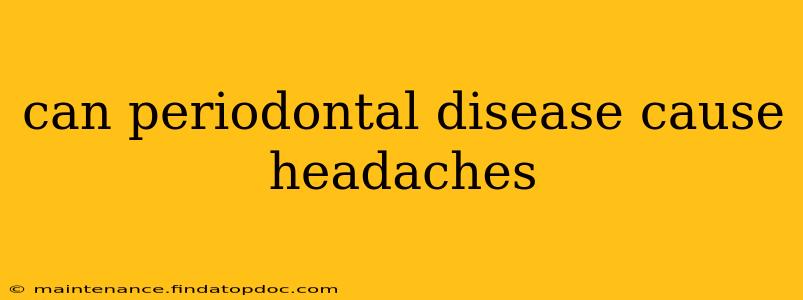Can Periodontal Disease Cause Headaches? The Surprising Connection
Periodontal disease, also known as gum disease, is a serious infection affecting the gums and supporting structures of the teeth. While its oral consequences are well-known – tooth loss, bad breath, and gum recession – many people are unaware of its potential systemic effects. One surprising link that's gaining attention is the connection between periodontal disease and headaches, particularly those of the tension-type variety. Let's explore this intriguing relationship.
While periodontal disease doesn't directly cause headaches in the way a migraine might, there's mounting evidence suggesting a strong correlation. The connection isn't a simple cause-and-effect relationship but rather a complex interplay of factors.
How Could Gum Disease Contribute to Headaches?
Several mechanisms may explain the link between periodontal disease and headaches:
-
Inflammation: Periodontal disease is characterized by chronic inflammation throughout the body. This systemic inflammation can trigger the release of inflammatory mediators, such as cytokines, which can affect the nervous system and contribute to headaches. The constant inflammatory response puts stress on the body, potentially leading to muscle tension and headaches.
-
Infection: The bacteria associated with periodontal disease can enter the bloodstream, potentially triggering an immune response that contributes to inflammation and headaches. This bacteremia (bacteria in the blood) is more likely in individuals with advanced periodontal disease.
-
Muscle Tension: Severe gum disease can lead to jaw pain and clenching or grinding of the teeth (bruxism). This can contribute to tension headaches, particularly in the temporomandibular joint (TMJ) area. The jaw muscles are directly connected to the head and neck muscles, so tension in the jaw can easily radiate to the head, causing headaches.
-
Stress: Dealing with the pain, discomfort, and potentially expensive treatment of periodontal disease can be stressful. This stress itself can trigger or worsen tension headaches.
What Types of Headaches are Linked to Periodontal Disease?
The most common type of headache associated with periodontal disease is the tension-type headache. These are characterized by mild to moderate pain, often described as a tight band or pressure around the head. While less common, there is some research suggesting a possible link to other headache types, though more research is needed in this area.
Can Treating Periodontal Disease Relieve Headaches?
While not a guaranteed solution for all headaches, treating periodontal disease can significantly reduce headache frequency and intensity in some individuals. Addressing the underlying inflammation and infection can help break the cycle of inflammation and pain. Improved oral hygiene and professional periodontal treatments aim to control the infection and reduce inflammation throughout the body.
Are There Other Systemic Effects of Periodontal Disease?
Yes, periodontal disease has been linked to a variety of health problems beyond headaches, including:
- Cardiovascular disease: Inflammation associated with periodontal disease can increase the risk of heart disease and stroke.
- Diabetes: Periodontal disease can worsen diabetes control, and poorly controlled diabetes increases the risk of periodontal disease.
- Respiratory infections: Bacteria from periodontal disease can be aspirated into the lungs, contributing to respiratory infections.
- Rheumatoid arthritis: The chronic inflammation may contribute to the development or worsening of rheumatoid arthritis.
How Can I Protect Myself from Periodontal Disease?
Maintaining good oral hygiene is crucial to preventing periodontal disease. This includes:
- Brushing twice daily with fluoride toothpaste.
- Flossing daily.
- Regular dental checkups and professional cleanings.
- Quitting smoking.
Disclaimer: This information is for educational purposes only and does not constitute medical advice. If you are experiencing headaches or suspect you have periodontal disease, consult with a dentist and/or physician for proper diagnosis and treatment. They can determine the cause of your headaches and recommend the appropriate course of action.
